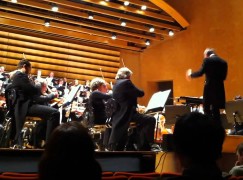Swedish orch shows how to handle concert disruption
mainThere were noises off stage at Friday night’s concert at the Gothenburg Symphony hall.
A disabled teenager, brought by her parents, began expressing loud approval of the music. A member of the audience got up and told the family to shut her up. The family left.
After the interval, Sten Cranner, the Gothenburg Symphony president and artistic director, addressed the audience. He said: ‘In 25 years in this sector I have never experienced anything like this. But I think one should be tolerant’. He added that he had spoken to the family and assured them that they were welcome at any of the orchestra’s forthcoming concerts.
The audience gave a one-minute standing ovation.
Report here.
The conductor was Santtu-Matias Rouvali and the visiting orchestra the Royal Stockholm Philharmonic.

UPDATE: The audience member shouted at the child and her family after the opening work, a piece called Threads by Paula af Malmborg Ward.
The concert continued with Prokofiev violin concerto no.2, soloist Valeriy Sokolov, and Shostakovich 9th symphony.





Comments